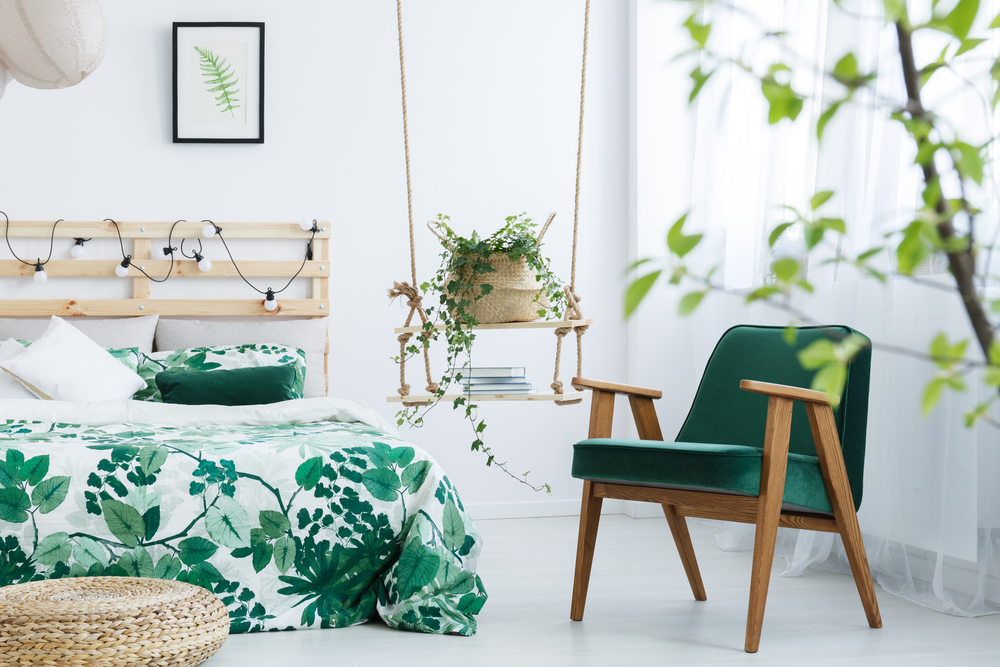
11 Jul 7 Steps to Creating Your Allergy-Free Bedroom
If you suffer with allergies or sensitivities, you’ve probably noticed that these can become even worse at night. It’s actually a fairly common problem: even if you have your allergies well-controlled all day, by night-time, you’re snuffling, coughing or scratching once again.
Why? According to research in the field of allergies, bodily reactions can be stronger at night due to a number of reasons, including medications wearing off, the stuffiness of the indoors (and therefore, the containment of irritating particles in the air and on furniture), and a relaxation of the muscles in preparation for sleep, which can temporarily constrict your airway, particularly when lying down.
But there ARE ways to combat the problem. Start with a bedroom that’s as non-irritating as possible. Never considered your bedroom may be the problem? Think again. If the area is closed-off with perhaps inferior air circulation and humidity, your bedroom might be your BIGGEST issue when dealing with allergies.
Here are the best ways to bring irritations of this nature down a notch:
MAKE SURE THE CIRCULATION IN THE ROOM IS ADEQUATE
Check and clean all vents (or have them professionally cleaned). Change air filters regularly per the manufacturer’s instructions. If possible and if you live in a low-pollution area (and if it isn’t a season when allergens particular to you are floating around), open the windows once a day in pleasant weather and close them again 2-3 hours later. Good circulation is critical to moving allergens out of the bedroom. If you still feel itchy, sniffly, etc. in the bedroom even with these changes, consider investing in a quality air purifier. Again, per the manufacturer’s recommendations, change and clean it regularly.
MAKE USE OF A QUALITY HUMIDIFIER
Dryness in the air can make your body’s allergic reactions feel even worse. Dry nasal and sinus cavities and a dry throat produce a scratchy feeling and could result in inflammation and swelling. If you suspect your room is dry, try a high-quality, clean humidifier. As with the advice on air ducts above, be sure you sanitise the humidifier properly; water can harbour mould if not kept clean and replaced regularly.
REPLACE SYNTHETIC BEDDING WITH NATURAL CHOICES
Try wool, linen and cotton rather than synthetic blends, particularly if you have contact dermatitis (a condition where skin contact results in rashes, eruptions, boils or itchiness, or some combination of these). Contrary to the belief of some who have never tried it, wool doesn’t have to be itchy, and it can be less irritating to some individuals than other fabrics/textiles. Make sure your sheets, quilts/comforter, pillow and pillowcase are all organic.
GO EASY ON CANDLES
Not all candles are allergen-free, and even soy or all-natural candles produce smoke to a degree. You may be an individual who is sensitive to this effect. Nix the candles for a while and see if you nighttime allergies improve.
TAKE ELECTRONICS OUT OF THE ROOM
Where possible, remove electronics in your room. These emit electromagnetic fields (EMFs) which appear to have negative consequences for some individuals. In addition, keeping things “bright” in your room isn’t doing your natural body rhythms, which expect the evenings to be dark, any favours. Take out the TV, leave your cell phone in another room (yes, really) and keep just a clock – if you really want to go all the way with this, locate a manual rather than electric/electronic clock.
MAKE A CLEAN SWEEP
Have you ever noticed those tiny particles that float in the air when you move about a brightly sunlit room? They’re dust, mites, and other allergens. So keep the bedroom clean. Use non-toxic cleaning supplies and manually clean (vacuuming, dusting, wet cloths, etc.) rather than using application cleaning products where possible. Also, wash and change your bedding regularly.
FORGET THE FRAGRANCE
If your room is clean, generally you should not require aerosol fragrance. If you do want to scent your room, try all-natural homemade potpourri or simply putting out peels of pleasant-smelling fruits and herbs, such as orange and mint. Change these by the end of the day so you don’t attract pests or encourage mould growth.
With these simple changes, you may see your nighttime allergy condition improving. Remember to continue to see your physician for any medication additions or updates and to confirm that allergies are the actual issue. Then go ahead and create your allergy-reduced bedroom, for a good night’s sleep tonight and every night.
Article written by Melanie Henson of Mother Sheep Organics
Once you’re satisfied with your bedroom, find out how you can make your kitchen eco-friendly as well.
Indoor plants can really help to purify the air in your home- read which ones are best.



No Comments